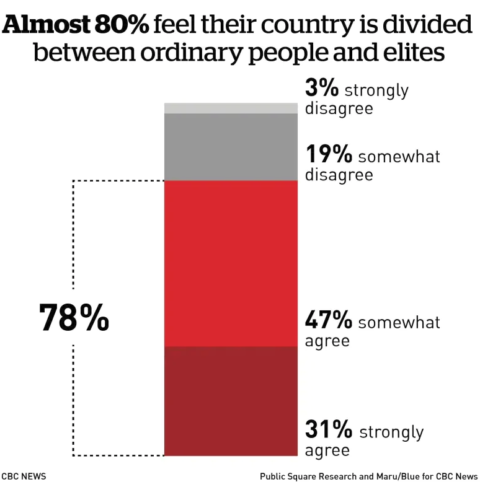Kim du Toit linked to this post by N.S. Lyons at The Upheaval, which postulates that the real issue in western society is really a conflict between the laptop class and the working class:
… I noted how from the perspective of those with the most wealth and power, as well as the technocratic managers and the intelligentsia (our “priestly class, keepers of the Gnosis [Knowledge]”), digital technology and global networks seem to have created “an unprecedented opportunity for Theory to wrest control from recalcitrant nature, for liquid narrative to triumph over mundanely static reality, and for all the corrupt traditional bonds of the world to be severed, its atoms reconfigured in a more correct and desirable manner.”
In this mostly subconscious vision of “Luxury Gnosticism“, the “middle and lower classes can then be sold dispossession and disembodiment as liberation, while those as yet ‘essential’ working classes who still cling distastefully to the physical world can mostly be ignored until the day they can be successfully automated out of existence.”
I also quoted a passage from the late Christopher Lasch’s book The Revolt of the Elites that is worth repeating here:
The thinking classes are fatally removed from the physical side of life… Their only relation to productive labor is that of consumers. They have no experience of making anything substantial or enduring. They live in a world of abstractions and images, a simulated world that consists of computerized models of reality – “hyperreality”, as it’s been called – as distinguished from the palatable, immediate, physical reality inhabited by ordinary men and women. Their belief in “social construction of reality” – the central dogma of postmodernist thought – reflects the experience of living in an artificial environment from which everything that resists human control (unavoidably, everything familiar and reassuring as well) has been rigorously excluded. Control has become their obsession. In their drive to insulate themselves against risk and contingency – against the unpredictable hazards that afflict human life – the thinking classes have seceded not just from the common world around them but from reality itself.
So let’s consider this using the protests as a lens, and vice versa.
To simplify, let’s first identify and categorize two classes of people in society, who we could say tend to navigate and interact with the world in fundamentally different ways.
The first is a class that has been a part of human civilization for a really long time. These are the people who work primarily in the real, physical world. Maybe they work directly with their hands, like a carpenter, or a mechanic, or a farmer. Or maybe they are only a step away: they own or manage a business where they organize and direct employees who work with their hands, and buy or sell or move things around in the real world. Like a transport logistics company, maybe. This class necessarily works in a physical location, or they own or operate physical assets that are central to their trade.
The second class is different. It is, relatively speaking, a new civilizational innovation (at least in numbering more than a handful of people). This group is the “thinking classes” Lasch was writing about above. They don’t interact much with the physical world directly; they are handlers of knowledge. They work with information, which might be digital or analog, numerical or narrative. But in all cases it exists at a level of abstraction from the real world. Manipulation and distribution of this information can influence the real world, but only through informational chains that pass directives to agents that can themselves act in the physical world – a bit like a software program that sends commands to a robot arm on an assembly line. To facilitate this, they build and manage abstract institutions and systems of organizational communication as a means of control. Individuals in this class usually occupy middle links in these informational chains, in which neither the inputs nor outputs of their role has any direct relationship with or impact on the physical world. They are informational middlemen. This class can therefore do their job almost entirely from a laptop, by email or a virtual Zoom meeting, and has recently realized they don’t even need to be sitting in an office cubicle while they do it.
For our purposes here, let’s call these two classes the Physicals and the Virtuals, respectively.




